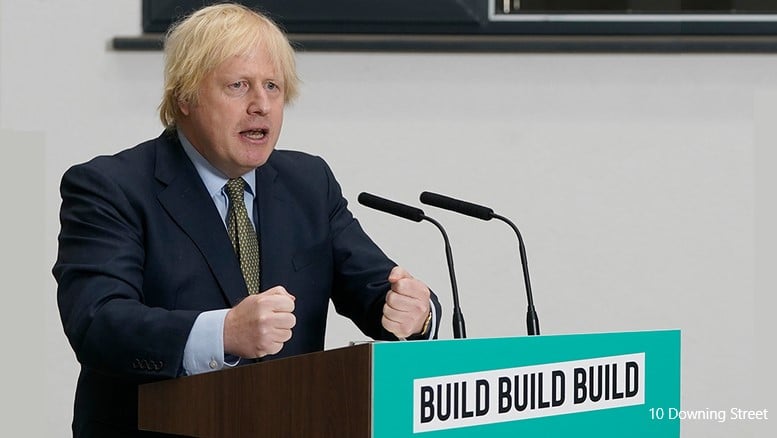
In a major speech, Prime Minister Boris Johnson has unveiled his plans for the United Kingdom after COVID-19.
Speaking in Dudley, he described how, in order to rebuild the economy, the government will use the crisis to tackle some of the country’s “great unresolved challenges of the last three decades”.
He plans to “build the homes, to fix the NHS, to tackle the skills crisis, to mend the gap in opportunity and productivity and connectivity between the regions of the UK, to unite and level up”.
“The government will build back better, build back greener, build back faster,” he said. “We will invest in and accelerate infrastructure across the UK; promote a clean, green recovery; reform our planning system; and strengthen the Union and local government.”
His plans cover everything from building more houses and reforming the planning system so that buildings can have their use changed more easily to accelerating expenditure on transport infrastructure – particularly roads but rail as well. He will increase spending on hospitals, schools and prisons and, in short, build his way back to prosperity.
“We are redoubling our efforts to get on with this now,” he continued, “in support of economic recovery and jobs right across the country by bringing forward £5 billion of capital investment projects, supporting jobs and the economic recovery.”
His list included:
- £1.5 billion this year for hospital maintenance, eradicating mental health dormitories, enabling hospital building, and improving A&E capacity. This will improve patient care, make sure NHS hospitals can deliver world-leading services and reduce the risk of Coronavirus infections.
- £100 million this year for 29 projects to improve the road network to get Britain moving, from bridge repairs in Sandwell to boosting the quality of the A15 in the Humber region. Plus £10 million for development work to unblock the Manchester rail bottleneck, which will begin this year.
- Over £1 billion to fund the first 50 projects of a new, ten-year school rebuilding programme, starting from 2020-21. These projects will be confirmed in the autumn, and construction on the first sites will begin from September 2021.
- £560 million and £200 million for repairs and upgrades to schools and FE colleges respectively this year.
- £142 million for digital upgrades and maintenance to around 100 courts this year, £83 million for maintenance of prisons and youth offender facilities, and £60 million for temporary prison places, creating thousands of new jobs.
- £900 million for a range of ‘shovel ready’ local growth projects in England over the course of this year and next. This will enable local areas to invest in priority infrastructure projects to drive local growth and jobs. This could include the development and regeneration of key local sites, investment to improve transport and digital connectivity, and innovation and technology centres to build on local comparative advantage.
- £96 million to accelerate investment in town centres and high streets through the Towns Fund this year. This will provide all 101 towns selected for town deals with between £500,000 and £1 million to spend on projects such as improvements to parks, high streets, and transport.
In the Autumn, the government will publish a National Infrastructure Strategy, which will set a clear direction on core economic infrastructure, including energy networks, road and rail, flood defences and waste. A new Infrastructure Delivery Taskforce, named ‘Project Speed’, will aim to cut down the time it takes to develop, design and deliver vital infrastructure projects. For example, it will look at how it can address outdated practices and identify blocks to progress.
The Prime Minister moved on to speak of green initiatives, including £10 million of funding to be made available immediately for the first wave of innovative R&D projects to scale-up manufacturing of the latest technology in batteries, motors, electronics and fuel cells.
A range of measures will encourage house building and the reuse of brownfield sites, and he will also look to strengthen the Union, taking “steps to guarantee and enhance our internal market and find new ways to invest in Scotland, Wales, England and Northern Ireland and focus on ‘levelling up’ our whole country”.
To progress these aims, his last comment was that the government “will carry out a review to look at how best to improve road, rail, air and sea links between all parts of the UK to create a more connected kingdom.”


Be the first to comment